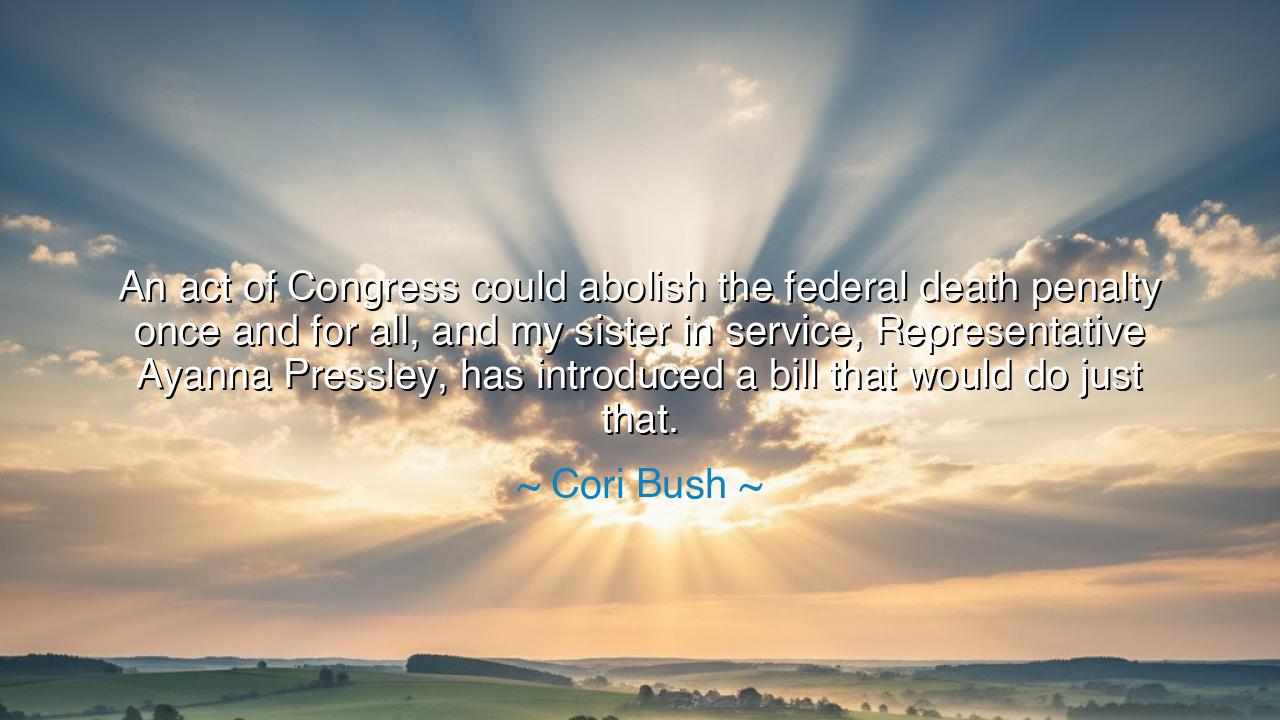
An act of Congress could abolish the federal death penalty once
An act of Congress could abolish the federal death penalty once and for all, and my sister in service, Representative Ayanna Pressley, has introduced a bill that would do just that.






In the words of Cori Bush, “An act of Congress could abolish the federal death penalty once and for all, and my sister in service, Representative Ayanna Pressley, has introduced a bill that would do just that,” we hear the voice of conviction rising from the heart of justice. These words are not spoken as mere politics, but as a moral proclamation, echoing through time like the appeals of prophets and reformers who came before. In them, we find the eternal struggle between vengeance and mercy, between the cold machinery of retribution and the warm, living pulse of compassion. It is a call not only for law, but for human awakening—a plea that the state should no longer claim the right to extinguish what it did not create.
The meaning of Bush’s words lies in her unwavering belief that the power of law can be turned from an instrument of destruction into a force of redemption. When she speaks of “an act of Congress,” she reminds us that justice is not fated—it is shaped by human hands, bound by courage or corrupted by fear. The death penalty, in her eyes, is not justice fulfilled, but justice forsaken: a relic of cruelty masquerading as order. By calling it to an end, she stands within a lineage of reformers—those who looked upon the suffering of the world and dared to imagine that mercy might one day triumph over blood. Hers is a voice of hope, yet also of remembrance—for she knows the pain borne by those who have seen the system fail, who have witnessed the innocent condemned, the poor forgotten, and the oppressed punished for surviving.
The origin of her conviction springs from the centuries-long human struggle to define justice. In the ancient world, the laws of Hammurabi declared, “an eye for an eye,” believing fairness meant mirrored pain. But even then, the wise questioned whether destruction could ever heal. The philosopher Seneca, in the days of Rome, wrote that “the wise man will forgive offenses rather than punish them.” In the teachings of Christ, the cycle of vengeance was broken by a simple truth: “Let him who is without sin cast the first stone.” And so, across the ages, the human heart has wrestled with this question—whether the killing of the condemned brings peace, or only deepens the wound. Cori Bush stands within this ancient debate, yet her cry is modern and urgent: that in an age of knowledge and conscience, we can no longer hide behind tradition to justify cruelty.
History offers us vivid lessons of both justice’s failure and its redemption. Consider Anthony Ray Hinton, who spent thirty years on death row for a crime he did not commit—a man condemned by bias and neglect, not by truth. When at last the evidence freed him, he did not curse his captors, but forgave them, saying, “The sun does shine.” His story mirrors the essence of Bush’s call: that to end the death penalty is not weakness, but wisdom. For every system built by humans carries the flaw of humanity itself. To give such a system the power to decide who lives and who dies is to pretend we are gods—when in truth, we are still learning to be just.
And yet, Bush’s words are not spoken in despair. They are filled with hope and solidarity, as she invokes her “sister in service,” Ayanna Pressley—two women of courage, joined not by ambition but by purpose. Their partnership recalls the sisterhood of the ancients—of Deborah and Jael, who rose in Israel’s hour of need, or Antigone, who defied unjust laws to honor the divine law of conscience. Bush’s recognition of Pressley is a symbol of unity, a reminder that reform is not the work of a lone voice crying in the wilderness, but of many hearts rising together, each adding its light to the fire of justice.
In speaking of abolition, Bush reminds us that true strength lies not in punishment, but in compassion. To abolish the death penalty is to affirm that life, however broken, retains its sacred spark. It is to believe that redemption is possible, even in those who have fallen furthest. This is not naïveté—it is moral courage, the courage to look upon darkness and refuse to become it. The ancient Stoics said that the just person must learn to master anger, for wrath blinds reason and corrodes virtue. Bush’s call to action is the modern echo of that same teaching: to choose mercy is not weakness, but mastery over the impulses that make beasts of men.
And so, dear listener, the lesson is clear: justice must evolve as conscience awakens. Do not accept cruelty simply because it has the weight of law behind it. Laws are made by humans—and humans, through compassion and courage, can unmake them. Question power, especially when it claims the right to kill. Stand with those who seek mercy, for they stand on the side of life. And above all, remember this: every civilization is measured not by how it rewards the righteous, but by how it treats the condemned.
In the spirit of Cori Bush, let us believe that change begins not with thunder, but with voices—steadfast, compassionate, and unyielding. Let us work so that the next generation may look back and see that we, too, answered the call of justice when it was our turn to speak. For though laws are written in ink, humanity is written in blood and breath—and it is our sacred duty to protect it, always.






AAdministratorAdministrator
Welcome, honored guests. Please leave a comment, we will respond soon